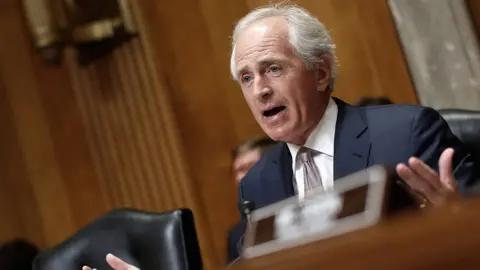Trump hands Iran chalice to Congress
 Getty Images
Getty ImagesDonald Trump, faced with reconciling a bluntly delivered campaign promise with the tricky realities of governing, again is taking a half-step - and tossing the issue to Congress.
On healthcare (repeal and replace - but you figure out how), residency for children who entered the US illegally (Daca protections are illegal, but they can remain in place for six months or maybe longer) and now the Iran nuclear deal, the president has faced sharp disagreement within his administration, leaving Congress to clean up any resulting mess.
Legislators don't make great janitors, however. They've repeatedly crashed on healthcare. Legislating Daca hasn't gotten off the ground, as Trump's on-again, off-again deal with Democrats has been replaced by hard-liner demands.
As for Iran, the president has decertified the nation's compliance - explaining that it has violated the spirit of the agreement - but Congress will have to decide whether to formally scrap the deal or retool it.
The administration recommends legislating "triggers" that would automatically impose penalties on the Iranian regime. That will take a lot of legislative manoeuvring - which hasn't exactly been Washington's strong suit lately.
Senators Tom Cotton and Bob Corker, who Mr Trump recently accused of facilitating the original Iran deal, have come up with a bill that keeps open the threat of sanctions even after the nuclear restrictions in the original Iran agreement expire.
Already, however, some Republican hard-liners are expressing scepticism. If Democrats can't be coaxed into support, any bill seems unlikely to get the 60 votes necessary to pass the Senate.
Time is also an obstacle, as cobbling together some type of agreement will have to compete with tax reform, budget negotiations and judicial confirmations on an already packed congressional calendar.
In three months, the president must again review Iranian compliance. He says if there's no further action, he'll officially axe the deal.
The original Iran legislation was a political contraption that allowed congressional Republicans to object to the agreement without killing it. They voted for a resolution condemning the deal, knowing that President Barack Obama would veto it.
Now, it seems, Mr Trump wants new provisions that will flip the equation, allowing him to kill it - or keep it - without getting his hands dirty.
If the president so desired, he could unilaterally impose new sanctions on Iran at any time and pull the trigger today, tomorrow or next year.
He - or his aides, looking for a way to mollify the president while keeping the deal alive - decided not to do that.
Instead, Congress will try to build one complicated legislative construction on top of another. Underneath it all, the Iran deal is still grinding along for now.
At some point, however, it could all come crashing down.
